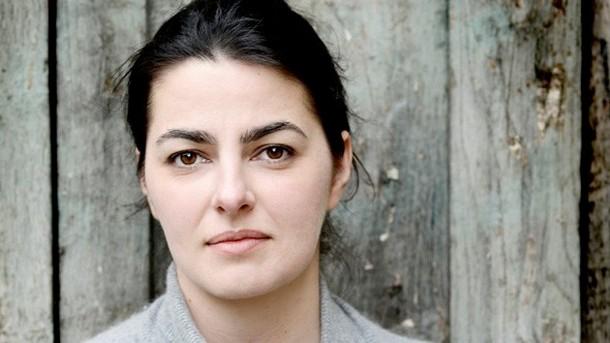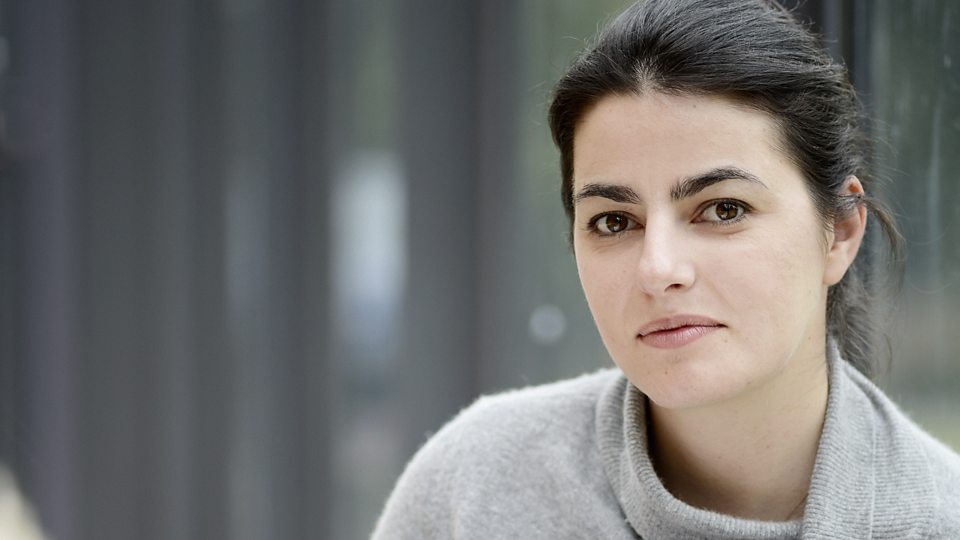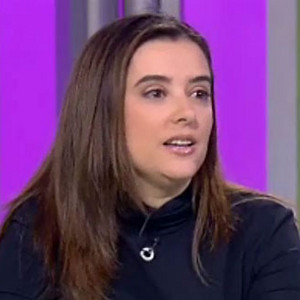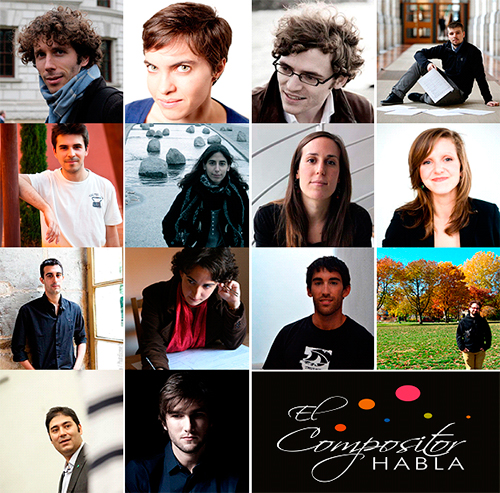Entrevistas
Dobrinka Tabakova | Entrevista a la compositora Dobrinka Tabakova
24/05/2019
She is one of the most consistently creative, astonish and original voices of the contemporary scene and undoubtedly a composer worth following. I have talked to her and this is what she told us.
 "Silence is the beginning of music and it is full of possibilities. It’s expectation but also respect, I think, because you need to have something to say in order to break the silence. It is a kind of respect for the world around you somehow."
"Silence is the beginning of music and it is full of possibilities. It’s expectation but also respect, I think, because you need to have something to say in order to break the silence. It is a kind of respect for the world around you somehow."1. Ruth Prieto: Who is Dobrinka Tabakova, and which characteristics define you best?
Dobrinka Tabakova: I started composing almost at the same time as I could play the piano. I come from a scientific family, doctors and academics and so on. They love music and that is how they opened this world for me. At home, my grandfather had a huge LP collection that I used to listen to and that is how my love for music began and I asked if I could start piano lessons when I was about six/seven, and fortunately they said yes. Then I started playing, writing and improvising, which is the first step in composition. In 1991, my parents and I moved to London where I auditioned for the Royal Academic of Music at the section for young people on Saturdays. I went to the junior academy on Saturdays where I began to study composition formally and ever since then I have been writing music, finding musicians that I could have a kind of link with and writing for them.
2. R.P.: Which is your DNA as a composer?
Dobrinka Tabakova: Well I would say that melody is very important for me. I enjoy writing melodies, finding and crafting melodies … so something which has some kind of a line, something that leads you from one place to another. I would say that melodies are very much one of the top things that I think about but I also think in terms of layers. I was born and grew up until 10/11 in a town in Bulgaria called Plovdiv, which is about 8.000 years old so I always think, and I am very conscious of, the layers of different civilizations, the layers that each civilization left and how we built on that and then there is a new beginning and then a new layer and then, etc.
"I think these layers are somehow embedded in my thinking and it is also in my music"
3. R.P.: What inspires you as an artist?
Dobrinka Tabakova: Well I think everything. Music of course was the trigger for me to explore my grandfather’s large collection of LPs as a result of which I discovered Schubert, Beethoven, Bach and many others. I felt connected to that heritage of music but I also feel very much connected to the music that is happening now of whatever kind, the pulse of the day, but I don’t really make a great distinction between the different art forms because I think they are all dialects of the same thing, which is hopefully communicating some kind of beauty and, whether you do that through words or through movements as a choreographer or through some kind of story as a film maker, I kind of see them all as a single family of people trying to say something or communicate something to others. It is all very inspirational but the ultimate thing for me is our home, our planet, nature and how much bigger they are than us.
4. R.P.: What are your musical roots, real or imaginary?
Dobrinka Tabakova: So many! It is like a tree. If I say classical, then what about all the things that feed into classical music like folk music, which has been an inspiration for many of the classical master pieces of Western Europe. Composers have been inspired by music from, I don’t know, the Far East or the Alps. For me all of these musical things are like one. And I think acoustic sounds are also very important to me. I would say that if there is one overarching thing of all of the musical link that I have it is that I am very much drawn to the acoustic instrument. So that’s probably the clearest answer that I can give.
5. R.P.: In this personal "inventory" that we all have of noises, sounds, music and songs, what can you tell us about your soundscape?
Dobrinka Tabakova: It is probably the same for all of us. We need something very neutral and very silent and very peaceful in order to give birth to music from that. Dissecting the world around me … I don’t know
6. R.P.: What does silence sound like?
Dobrinka Tabakova: Silence is the beginning of music and it is full of possibilities. It’s expectation but also respect, I think, because you need to have something to say in order to break the silence. It is a kind of respect for the world around you somehow.
7. R.P.: When you compose, do you imagine soundscapes, conglomerates of sounds that you can transform into written music, or it is a melody more of a starting point?
Dobrinka Tabakova: I think it is different every time. More than anything, when I start composing I need to have an idea of where the piece will go… an architectural sketch of what the piece will be like. For example, 11 years ago when I wrote the septet «Such different paths», I had very clear idea that it would start with a burst of energy and then that the energy would slowly find peace towards the end. So, the desired shape was the initial step for the composition.
8. R.P.: Have you got a composer of reference or someone who made a special impression on you as a composer and as an artist?
Dobrinka Tabakova: Everybody who writes something that touches me. But definitely the composers from my grandfather’s collection of LPs (Schubert, Bach) are big inspirations. Messian is another great inspiration. And, although his music is very different, Iannis Xenakis is another influence. There is something very strong in the music that he writes.
 9. R.P.: Can you define “contemporary” and tell us in which way Dobrinka Tabakova is a contemporary composer?
9. R.P.: Can you define “contemporary” and tell us in which way Dobrinka Tabakova is a contemporary composer?Dobrinka Tabakova: I’m living now and I’m breathing the air of this generation so I think it’s inevitable that this is our time. Contemporary must be of this time. Anyone who creates something right now is contemporary in my view.
10. R.P.: What is your main obsession as a composer when you are working?
Dobrinka Tabakova: I think the overall shape of the piece is very important for me. The overall shape is in a way the trigger for the piece … the thing that ignites it. The shape of the piece is very important.
11. R.P.: How do you go about putting together a new work? Could you describe your creative process?
Dobrinka Tabakova: It depends. Sometimes specific festivals or musicians give you very specific briefs. If you are working with texts, for example, the structure of the piece is predefined and what you are trying to say is already encoded in the words. That is very different to writing something more abstract. For an example of the more abstract, when I wrote “Together Remember to Dance”, a twin piano concerto for the Amsterdam Sinfonietta, I decided that it should be a kind of symmetry of uneven movements. So, while I followed the classic concerto line of three movements, I incorporated elements to reinforce the message behind the piece. The first movement is a representation of the difficulty and joy of living in the “big city” with its mixed and multicultural society. So, it’s a combination of friction, energy and drive. These are among the thoughts that I had when starting writing a piece.
12. R.P.: How do you see the contemporary music scene today?
Dobrinka Tabakova: Much of it, particularly in the music world, is quite underground. It’s interesting when you compare the situation of contemporary music with that of, let’s say, contemporary art, which is thriving, very visible and, also, visible socially. Contemporary music in general, and classical contemporary music in particular, needs more of this. I would love to see more awareness that the world of contemporary music actually exists and to give more of a presence to all of those exciting voices. For 7 years or so, I ran a contemporary music / concert series here in London. It was very specific. You typically had almost the same people every week coming to the concerts. It took a great deal of work, including with the press, to raise awareness.
"I think that people would be fascinated to see what happens and to hear what happens if only they were given a chance to discover and to be informed"
13. R.P.: Is it difficult to perform avant-garde projects in these times of crisis?
Dobrinka Tabakova: It was always difficult. In the seventies in New York, a lot of this was done on a voluntary basis. It’s not easy to make a living from “avant-garde projects” as you call them. But this is what drives me. I am passionate about it. I love it. This is my life, this is my profession, this is how I pay my bills.
14. R.P.: What would you like to do as an artist that you have not been asked to do yet?
Dobrinka Tabakova: To be honest, the main thing for me is to work with musicians with whom I feel that I have a connection, musicians who will bring to life a piece in ways that I could only have dreamt of. So, my dream is not so much about projects but the desire to continue working with very passionate advocates of new music.
15. R.P.: We have the idea, probably very old, of what a concert is: people playing and people listening. How do you imagine “concerts” in the XXI century?
Dobrinka Tabakova: People have tried to reinvent this model for the last 50 years to make things a little bit more relaxed, to have a drink, to talk a little bit. I do not know to be honest. I think it’s such a fundamental thing to create communication through art. I love what Brian Eno said that children learn through play and adults play through art. I like that quote a lot because I think that to be in a concert and to be still and to be quiet is, to me, a really great thing because you are allowing a conversation to happen on a really high level. If you are distracted by noises and by drinks, etc, engagement at that level is not possible. So, for me, the ritualism of the concert is important. One thing I would say, however, is that, clearly, the attention span is limited and that we should be concentrating on shorter concerts. The idea of a whole evening with an interval, one half, second half, is very heavy for the modern pace of life. So, for me, the future is shorter concerts: one long think without an interval, which bars are going to hate because the interval is when they make their money.
16. R.P.: Do you think it is still necessary to make women visible in music?
Dobrinka Tabakova: Yes, I think the momentum at the moment is good and that it’s important to keep it going. What I wouldn’t stress so much is just to be saying OK let’s have more of this 50/50 split or similar ideas because at the same time I really think that the exposure you get should be in proportion to the merit of your work.
17. R.P.: Do you think that “quotas” are the right thing?
Dobrinka Tabakova: Historically, there’s possibly a case for quotas because the balance is so uneven. But I don’t think that quotas should be the leading narrative. It shouldn’t be that we need to get as many women as men. I think that we just need to be more conscious about telling girls early on that music and composition are options for them and about making them understand that there are role models out there supporting their cause. I had two wonderful female composers, teachers here in London, so I was never thinking that perhaps this is not the world for me. If you have, or if you can work with, role models, then in 10 years you can catch up on centuries of neglect or disadvantage. So, if we are committed, I don’t think that quotas are necessarily the way, or the number one way, forward. I think that we just have to give girls the opportunity to think that music and different aspects of music are a world for them also.
18. R.P.: What could we do to make this musical world more inclusive?
Dobrinka Tabakova: We need to do all of the things that are not happening right now, We need to reverse them. In music and art, schoolchildren can have a future if those subjects are taught early on and without discrimination. It’s not about becoming a professional musician or composer. It’s simply about developing an appreciation for this music so that music has a healthy and varied audience. This what we should be trying to achieve socially.
19. R.P.:: What are you working on now?
Dobrinka Tabakova: At the moment, I am composer in residence with the BBC Concert Orchestra so l have quite a few orchestral commissions for them. The next one is coming out now in the summer. Then, I am writing a string quartet for the Goldmund Quartet and some other chamber pieces, which is close to my heart because it is a combination between larger pallets of colours like orchestra music and the specificities of chamber music.
The photograph by Sussie Alhburg has been kindly provided by the composer for this interview
Biblioteca
Destacamos ...
Nueva Sección Directorio
dedicada a la promoción de compositores, intérpretes, instituciones y editoriales.

dedicada a la promoción de compositores, intérpretes, instituciones y editoriales.



